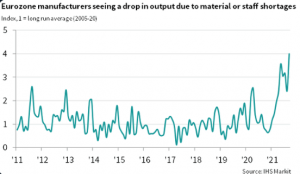This feels different. It can’t even be blamed on Brexit. Yes, the UK continues to provide the best tragi-comedy headlines with Kim-Johns-Un’s rocket ambitions for ‘Galactic Britain’ just the latest exercise in deflection. However, on a global basis there is growing awareness that business activity faces an unusual trifecta of cost shocks. Let’s start with the one which appears to be affecting almost everybody – global energy prices.
Natural gas prices have more than doubled in 2021 and are approaching crude oil-equivalent pricing levels of $200 per barrel! Not surprisingly, this has impacted electricity prices in many countries and has caused China to hit the panic button. This week China’s Vice Premier, Han Zheng, ordered the country’s top state-owned energy companies “to secure supplies for this winter at all costs”. This will certainly focus anxious minds in other economic regions but this writer is beginning to feel the real cost shock will be one which hasn’t flexed its muscles in more than 40 years.
Headlines closer to home have spoken about Europe-wide truck driver shortages and UK staffing issues in food production and hospitality. However, a phenomenon known as “The Great Resignation” has caught the eye after a staggering 4 million workers resigned in the US in July alone. In Ireland and the UK surveys show that up to 40% of staff see their work futures elsewhere. The battle to keep talent is about to become more expensive and the following recent headlines would suggest same:
- A Sharp Rise In Wages Is Contributing To Worries Over Inflation – CNBC
- German Workers Strike For Higher Pay As Eurozone Inflation Surges – Financial Times
- Why Wages Are Growing Rapidly – Both Now And In The Future – Forbes
So, that’s two rather important cost inputs on the rise – energy and labour. The final cost shock is pandemic related but could take years to remedy. Supply chains are under immense pressure and semiconductor chips have often been referred to as the “oil” in a global digital economy. Recent estimates by consulting firm, AlixPartners, suggest semiconductor shortages have cost the auto industry alone more than $200 billion. Furthermore, the pandemic in the form of the Delta variant is now wreaking havoc with important Asian manufacturing country bases like Vietnam triggering output drops in European manufacturing. IHS Markit have produced rather stark data on the hit to Eurozone production caused by staff and materials shortages. The chart below indicates these shortages are four times more likely than usual to reduce production levels:

The triple whammy of cost shocks can only lead to one thing – inflation. The “I” word has been missing in Europe for decades but the latest figure for Eurozone consumer prices is showing a 3.4% inflation rate. That’s a 13 year high. The next big question is whether this inflation spike is temporary or permanent?
In an inflationary world one would expect bond yields (income) to rise to a level to compensate for the erosion of purchasing power. Bizarrely, there are a whopping $16 trillion of bonds trading globally with NEGATIVE yields. This would suggest bond traders are pricing the inflation threat as just a temporary thing. This writer would not be so sure and is intrigued by trading activity in what can only be described as an emerging asset class – cryptotech.
Inflation is usually perceived as the enemy of money/cash as purchasing power is diminished with rising prices of goods and services. Indeed, gold was often bought as inflation protection. However, gold prices have barely moved over the last year. Are institutions looking elsewhere for stores of value? Well, one of the leading cryptocurrency exchanges, Coinbase, has reported Q2 institutional trading volumes of $317 billion, more than double Q2 retail volume of $145 billion. That level of institutional activity strikes this writer as more than curiosity.
The entire cryptotech ecosystem of currency/coins, blockchain infrastructure and tokens(NFTs) has now grown into a digital asset class with a market capitalization worth almost $2 trillion. No doubt there will be volatility ahead for the crypto world but the business potential of this technology has an inflationary twist. We might be entering an era of higher business costs but, ironically, blockchain technology has the potential to revolutionize service propositions by cutting out intermediaries, speeding up transaction processes and cutting costs by up to 90%. Get ready for the big winter squeeze on business costs but also for increased crypto curiosity too!









